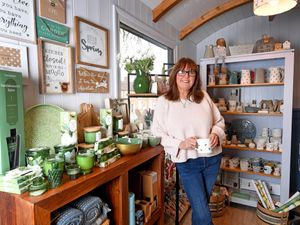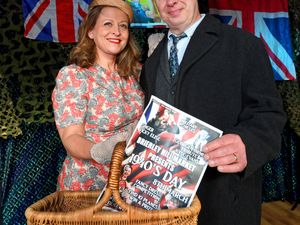Ding, dong! We're ringing the changes say Black Country bell ringers
It's a centuries-old tradition. The sound of church bells is one we've all grown up with – whether they are ringing out to celebrate a wedding, signalling the time for worshippers to attend services or welcoming the beginning of a new year.
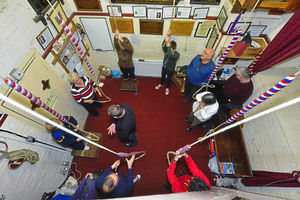
The musical chimes have also become known as the sound of peace – bells up and down the land remained silent during the Second World War, only ringing again once the conflict was over.
But there have been concerns that bell-ringing is a dying art; in some parts of the country it's failed to appeal to the younger generations.
Even members of the Central Council of Church Bell Ringers have expressed fears that it's future could be threatened due to a shortage of ringers.
But in a corner of the Black Country this much-loved British tradition is alive and kicking.
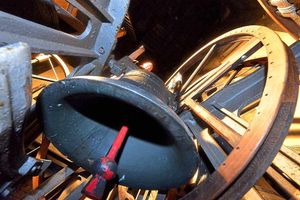
While some churches are finding it hard to attract new blood, Christ Church in Coseley has a healthy contingent of more than a dozen regular ringers from across the community.
They range in age from 10 to 77; there's no lower or upper age limit in this tower, which has eight bells dating back to 1936.
Two of the youngest in the group are 10-year-old Rufus Temple-Purcell and his 11-year-old brother Asa, who have been ringing for 18 months and two years respectively.
They're joined at weekly rehearsals by their dad Adrian, who started learning the ropes five years ago.
"None of us attend the church but we enjoy ringing. I think it's a real skill because it involves lots of concentration and it's also therapeutic.
"The children get a lot out of it. It's something that's a bit unusual that not many people do," explains Adrian.
But the biggest plus for the 50-year-old teacher is that the three of them are doing their bit to ensure the bells are still heard for years to come.
"I'm not at all religious but I know I would hate it if we could no longer hear the bells.
"The bells are part of our tradition. They've been used to mark major events throughout our history and they are part of who we are. It is nice to be involved in something that people have been doing for hundreds of years," says Adrian.
For retired school teacher Dorothy Turley, aged 77, her time in the tower is helping to fulfil a childhood ambition.
"When I was in my teens there was an opportunity to learn how to ring at St Thomas' in Dudley but my Dad said 'no'.
"In those days if your Dad said 'no' that was the end of it. So when the opportunity arose again 20 years ago, I took it," she explains.
For Dorothy, the hobby offers many benefits. "I enjoy the fact that it keeps you mentally alert and it's good upper body exercise.
"It's also a very social activity – bell ringers tend to be a nice bunch."
Despite the decline in bell-ringing elsewhere Dorothy says Christ Church has seen a resurgence in recent years.
"We've got more ringers now than we've had for years. We've had a lot of new learners take it up during the past two years.
"I would never say we had enough because you have to be prepared for illness or people moving away but we're definitely not struggling at the moment," she adds.
The bell tower captain is Gordon Birks, who has been ringing for 33 years and is in charge of training the new recruits.
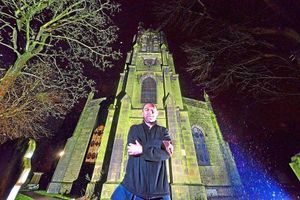
Having started at the age of seven carrying on a family tradition which he is now sharing with his five-year-old son Joseph.
"I used to go along with my Dad, sit in the tower and listen to the bells while he was ringing.
"As soon as I could have a go myself, I was ringing and I've been ringing ever since.
"I love it. I will go out ringing as often as I can. I would ring every day if I could," he adds.
The origins of change ringing lie in the 16th century when church bells began to be fitted with a full wheel.
This gave ringers control of their bell, allowing sets of bells to be rung in continuously changing patterns.
While a peal is a non-stop sequence of a minimum of 5,000 changes where each sequence is different and cannot be repeated on seven or more bells.
This takes around three hours to ring and is commonly described as the bell-ringers' equivalent of a marathon, requiring concentration and stamina to complete the peal, while some will set themselves the challenge of even longer peals.
Gordon says: "The longest I've rung for is six hours and 26 minutes continuously which was quite a challenge but great fun."
Music is created by altering the order in which the bells sound and the sequences of these changes are called methods.
Learning a few simple methods opens the door for ringers to join in with other groups in bell towers across the globe.
"The great thing about ringing is that wherever you go in the world, you can go into a church and ring. You will always be made welcome," says Gordon. "There are not many hobbies where the same could be said," he adds.
While many people might think it's physically demanding work, but it's not as much as you might imagine, according to Gordon, who says bell-ringing is actually more of a workout for the brain.
"Strength doesn't really come into it because the bells and the ropes do a lot of the work for you so it's all about technique.
"It's also very good for your memory as you are learning techniques and if you are learning the methods then you have to remember them," he explains.
"I would tell everyone to give it a go because I love ringing. You're never too old to learn," adds Gordon.
The movement of bell ringing has been said to help many people to stay active longer and increase their agility. While some bells can weigh up to 4,500kg the majority are much lighter, making it a suitable hobby for all ages.
"It's great exercise, for both the body and the mind. It's really good for anyone who has asthma because it's not too strenuous," says Rose Webb, 69, who has been ringing for 18 months.
"It's something that anyone can have join with and you can start as a complete beginner, knowing nothing at all about ringing bells," she adds.
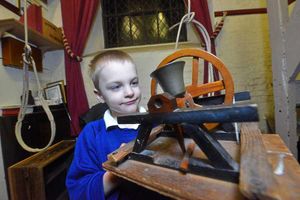
Christ Church congregation members Matt and Kim Foreman, who live 'within the sound of the bells' both joined the group around a year ago.
Although their connection was through the church, Matt, 50, said the group welcomes anyone even if they don't to attend weekly services.
"There's a common belief that to be a bell-ringer you must go to church but that really isn't the case. A lot of people enjoy hearing the bells but don't go to church.
"There are no rules about who can ring here and you don't have to be involved with the church," explains Matt.
"It's great because you never stop learning. We're amongst experienced ringers who only happy to point us in the right direction," he adds.
Parish secretary Jason Stanford, 46, who is married to the church vicar Emma Stanford and has been ringing for two years, says: "It's a very social activity as well because everyone is ringing together as part of a team.
"We rang the bells at midnight on New Year's Eve for the first time for many years and we had a great response from everyone in the area who enjoyed hearing them."
By Heather Large

